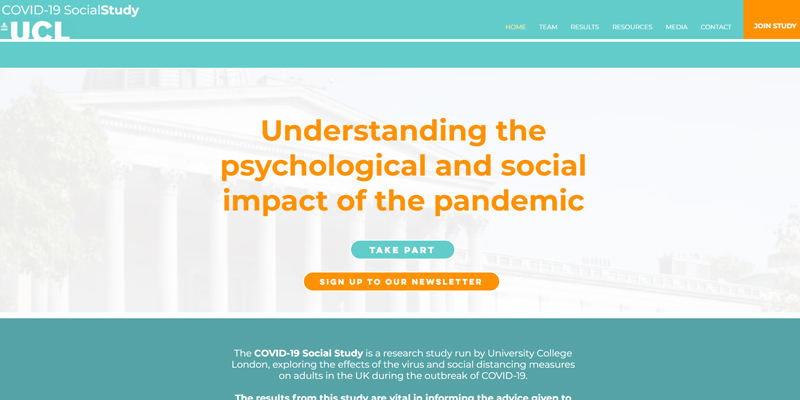Cheryl Lloyd is programme head for education at the Nuffield Foundation, where she leads the organisation’s education research portfolio relating to young people, but also managing some projects that cut across the Foundation’s research interests, such as UCL’s COVID-19 Social Study. Her role involves assessing applications for research funding and managing engagement around grants. Cheryl also supports grant-holders to help their projects progress as planned and provides feedback on draft research reports and plans for communication and engagement.

“Generally, findings from the survey are showing that women and people from ethnic minority backgrounds are having a more challenging time during the pandemic.”
Background to the COVID-19 Social Study
The UCL COVID-19 Social Study is a panel study, set up by Dr Daisy Fancourt and colleagues in March 2020 to study the psychological and social experiences of adults in the UK during the COVID-19 pandemic.
In March last year – recognising that the pandemic was going to be much more than a public health crisis – the Foundation put out a call for research projects to understand and address the wider social impacts. Daisy applied to that funding call, and we have been funding the project since April last year.
Methodology
Since 21st March, participants have been completing online surveys, initially every week. The survey focuses on capturing information about the ways in which the pandemic might be affecting social and psychological outcomes such as anxiety, depression, life satisfaction, loneliness and things that are causing people stress. It also asks people about their individual characteristics such as age, gender, ethnicity and household income, whether they are going outdoors, compliance with guidelines and attitudes to the vaccine, amongst many others.
Building up a wealth of data
By surveying participants regularly in this way, the researchers have built up a wealth of data about peoples’ experiences and trajectories over the course of the pandemic. This allows the researchers to look at patterns over time, and also explore how these might be related to changes in restrictions and government guidance, such as the easing of lockdown last summer, as well as the impact of high-profile media stories, such as the “Cummings effect”. Analysis of this kind would not be possible with less frequent and detailed surveys.
Drilling down
In November 2020 a press release about the research said:
“Women have found the COVID-19 pandemic more challenging than men psychologically, reporting higher levels of depression, anxiety and loneliness, and lower levels of life satisfaction and happiness.”
Similarly, the press release also stated:
“Respondents to the study from Black, Asian and minority ethnic backgrounds also reported consistently worse mental health than other groups across every measure throughout the pandemic, with higher levels of depression, anxiety, thoughts of death or self-harm, reported abuse and loneliness, and lower life satisfaction and happiness.”
Highlighting challenges faced by people from ethnic minority groups
Generally, findings from the survey are showing that women and people from ethnic minority backgrounds are having a more challenging time during the pandemic, for example, the latest report (covering up to 10th January 2021) highlights that people in these groups are experiencing higher anxiety, depression, loneliness and lower levels of life satisfaction.

It’s important to recognise that there are a number of different risk factors related to poor mental health, and that these intersect. For example, financial insecurity can be linked both to poorer physical and mental health and in general, due to a variety of reasons, people from ethnic minority backgrounds are more likely to be living on lower incomes.
We also know that women and people from ethnic minority backgrounds were more likely to experience higher levels of depression and anxiety than men and those from White backgrounds before the pandemic too.
How findings can be used to help
Findings are routinely shared with government committees, in the media as well as with the public health and scientific communities. The findings help inform current support needs by identifying which groups are more vulnerable to the social and psychological effects of the pandemic, particularly the enforced social isolation, and who might need longer-term support where these effects persist.
They are also helpful in planning for how we can reduce distress in the event of further waves of this pandemic, and future pandemics.
Increasing representation of ethnic minority groups
Unfortunately, ethnic minority groups are under-represented in the project, so the data doesn’t fully capture the experiences of different ethnic groups, but we’d like to address this. (Sadly, it is a problem with much data collection and social science research generally, and one that the Centre on the Dynamics of Ethnicity is working hard to address.) But there is more that can be done and Womanthology readers can help.
The study is continuing to survey participants, and the researchers are undertaking more in-depth research to explore experiences in greater detail. I would encourage all UK based Womanthology readers to consider participating in the research so that findings reflect better the diversity of the population’s experiences and perspectives. There is much to be done to understand and address different inequalities and what drives them within our society, and research is an important part of that process.
We’d welcome more participants from ethnic minority backgrounds as their input will only strengthen the research further.
To take part visit:
https://www.covidsocialstudy.org/
You can also stay up to date on the findings from the study by signing up to the study’s newsletter.
More information – fortnightly reports, and articles from the COVID-19 Social study are available from https://www.covidsocialstudy.org/results.
A short briefing on the key insights from the Nuffield Foundation’s COVID-19 research to date is available from https://www.nuffieldfoundation.org/news/opinion/emerging-learning-from-our-covid-19-research





